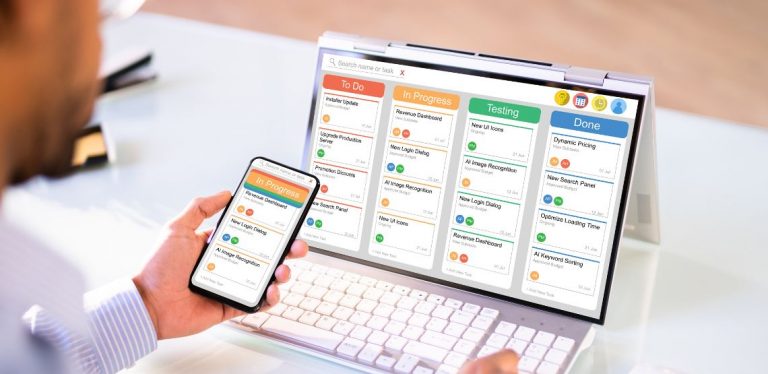Driving Growth
In an increasingly complex and competitive business landscape, leveraging the right software solutions is critical for achieving operational excellence. Organizations, regardless of size or sector, utilize a range of software to manage different facets of their business activities. This article delves into various types of software solutions that are essential for modern businesses, their utility and the companies that provide these technological tools.
Software Solutions for Businesses
1. Enterprise Resource Planning (ERP) Software
ERP software is a comprehensive solution that integrates core business processes, including inventory management, accounting, human resources, customer relationship management and more, into a single system. It streamlines data across the organization, providing a unified source of truth and facilitating better decision-making. By automating many routine tasks, ERP software increases efficiency and reduces the likelihood of errors, ultimately enhancing overall productivity.
2. Customer Relationship Management (CRM) Software
CRM software manages a company's interactions and relationships with both potential and existing customers. It helps businesses understand their customer base, manage leads and sales pipeline and deliver actionable data insights. CRM systems are designed to improve the relationship with customers, help in customer retention and drive sales growth.
You May Also Like:
Related Search Topics (Ads)
3. Supply Chain Management (SCM) Software
SCM software facilitates the management of the flow of goods and services from manufacturers to consumers. It encompasses the planning and control of inventory, sourcing, procurement, production and logistics. Supply chain integration helps organizations reduce excess inventory, minimize costs and improve the efficiency of distribution channels.
4. Human Resources (HR) Management Software
HR management software streamlines the complex task of managing an organization’s human resources. It supports various HR functions, such as recruiting, payroll, performance evaluations and benefits administration. It can also contribute to strategic HR planning, workforce management and compliance with labor laws.
5. Environmental, Health and Safety (EHS) Software
EHS software is designed to help organizations comply with legal standards and corporate policies related to the environment, health and safety. This tool is vital for managing risks, reporting incidents and tracking the performance of EHS initiatives. It plays a significant role in creating a safer workplace and minimizing the environmental impact of business operations.
6. Enterprise Mobility Management (EMM) Software
EMM software is vital for organizations that employ a mobile workforce or support a Bring Your Own Device (BYOD) policy. It provides security and management of mobile applications, content and devices, protecting sensitive business data and ensuring compliance with data protection requirements.
7. Enterprise Asset Management (EAM) Software
EAM software assists with the lifecycle management of the physical assets of a company. It helps track the location, status and performance of assets, facilitating maintenance, reducing downtime and maximizing their utilization over time, which can result in significant cost savings and increased asset longevity.
8. Marketing Automation Software
Marketing automation software empowers businesses to effectively target customers with automated marketing campaigns across different channels such as email, social media and websites. This software helps in lead generation, segmentation, lead nurturing and scoring, customer lifecycle marketing, cross-sell and upsell and marketing ROI measurement.
9. Content Management System (CMS)
A CMS enables the creation, management and optimization of digital content. This tool is crucial for businesses that need to manage their website content, blogs and other online material without the need for extensive technical knowledge. It helps ensure content is up-to-date, relevant and consistent across all platforms.
10. Project Management Software
Project management software provides organizations with a framework for planning, executing and overseeing projects. It enables project tracking, resource allocation, collaboration and documentation, helping ensure projects are delivered on time and within budget.
Business Software Companies
Now that we’ve reviewed the types of software solutions crucial for businesses let’s look at some business software providers.
Scoro
Scoro is a comprehensive solution that combines project management and professional service automation to offer businesses features like billing, work scheduling and reporting.
Thryv
Thryv offers a small business management platform that delivers essential business functions, such as payment processing, customer relationship management and social media management.
StudioCloud
StudioCloud provides a suite of tools to help manage clients, invoicing, scheduling and more, catering to the operational needs of small to medium-sized businesses.
Zoho One
Zoho One is known for offering an extensive suite of software that businesses can use to run their entire operation across sales, marketing, productivity and more.
Odoo
Odoo presents a full suite of open-source business apps that cover areas ranging from CRM, e-commerce, accounting, inventory, point of sale and project management.
Basecamp
Basecamp specializes in project management and team collaboration software that helps teams stay on the same page.
Accelo
Accelo streamlines and automates service operations in small to medium-sized businesses, providing tools for client work management.
NetSuite
NetSuite offers a robust, cloud-based suite designed to help businesses automate key functional areas like financials, operations and commerce.
Proofhub
Proofhub focuses on project management and team collaboration, offering tools that simplify planning, organizing and delivering projects.
Active Collab
Active Collab is well-suited for project planning, including task assignments, time tracking and billing, making it easier for teams to align their efforts.
Harnessing the Power of Software
When it comes to choosing the right software solution, businesses must consider their specific needs, scalability, ease of use and integration capabilities. The key to success lies in selecting a partner who understands the particular challenges of your industry and can provide software solutions that drive measurable results.

